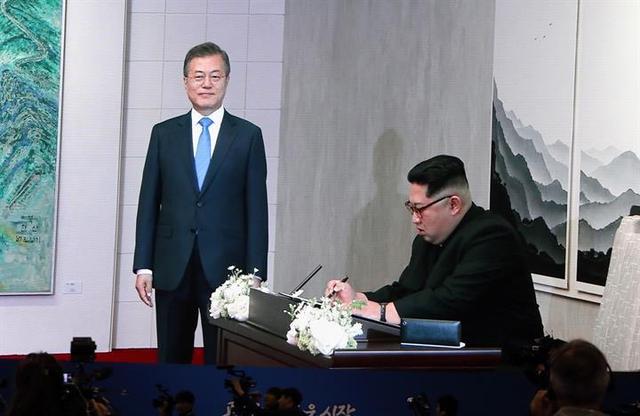KIM JONG UN'S FAMILY VALUES
金正恩的家庭觀念
It's offcial: North Korea is moving into the future.
官方消息:朝鮮正在邁向未來。
On April 29, Kim Jong Un's regime announced that
4月29日,金正恩政權(quán)宣布,
it would shift its clocks forward 30 minutes on May 5, to unify with South Korean time—
5月5日,朝鮮將把時鐘撥快30分鐘,和韓國時間保持統(tǒng)一——
one of several conciliatory gestures decided at his historic talks between Kim and South Korean President Moon Jae-in.
在與韓國總統(tǒng)文在寅舉行的歷史性會談期間,金正恩多次作出和解姿態(tài),這一舉措就是其中之一。
After a meeting oozing with symbolism at the riven peninsula's demilitarized zone (DMZ),
朝鮮和韓國在分裂的朝鮮半島的非軍事區(qū)(DMZ)舉行了一場充滿象征意義的會議,
the North and South also agreed to restart reuniting families, open a liaison office and put an end to the Korean War,
雙方同意重啟兩國之間的離散家庭團聚活動,設(shè)立聯(lián)絡(luò)處以及結(jié)束朝鮮戰(zhàn)爭,
which officially is still being waged, as only an armistice, rather than a peace treaty, was ever signed.
由于只簽署了一項停戰(zhàn)協(xié)定而沒有簽署和平條約,這場戰(zhàn)爭還沒有正式結(jié)束。
“A new history begins now,”
“新的歷史開始了,”
Kim wrote in the visitor's book of the DMZ's Peace House as the first North Korean leader to visit the South.
金正恩在該非軍事區(qū)“和平之家”的訪客留言簿上寫道,他是首位訪問韓國的朝鮮領(lǐng)導人。
“An age of peace, at the starting point of history.”
“和平時代,新的歷史從現(xiàn)在開始。”
Despite all the optimism, the summit's description of denuclearization was kept vague,
盡管形勢一派樂觀,但峰會對無核化的描述還是比較曖昧,
leaving observers to guess what Kim might want in return.
金正日想要什么回報,觀察人士只能靠猜測。

According to South Korean officials,
據(jù)韓國官員透露,
Kim said he would offer up his nuclear arms in exchange for a nonaggression pact with the U.S.
金正恩說,他愿意獻上核武器,以換取與美國達成互不侵犯條約。
But top American officials have signaled that they're skeptical of the rhetoric.
但美方高級官員表示,他們對這一言論持懷疑態(tài)度。
For North Korea to abandon nuclear weapons would require a fundamental change in its founding and governing precepts.
朝鮮要放棄核武器,就必須從根本上改變其建國理念與執(zhí)政原則。
Bylaws of North Korea's all-powerful Workers' Party define its purpose as to complete the revolution and “l(fā)iberate” the South,
一枝獨秀的朝鮮勞動黨在黨章中將完成革命和“解放”韓國確立為黨的奮斗目標,
while those who oppose the party are “enemies of the people.”
而那些反對該黨的人就是“人民的公敵”。
Besides, North Korea's founder, Kim Il Sung, had a signature philosophy of juche, best defined as patriotic selfreliance.
此外,朝鮮的國父,金日成,有一套標志性的主體思想,而對這套思想最好的定義就是“愛國主義自力更生”(政治上自主、經(jīng)濟上自足、國防上自衛(wèi))。
This would seem impossible to reconcile with accepting promises of nonaggression from age-old nemesis the U.S.
而這一點似乎不可能與接受朝鮮的宿敵美國的不侵略承諾相調(diào)和。
Kim Jong Il—son of Kim Il Sung and father to the current Supreme Leader—added his own philosophy of songun, or “military first,”
金正日——金日成之子,現(xiàn)任朝鮮最高領(lǐng)導人金正恩之父——又加上了他自己的“先軍”哲學,
which built on juche while wrapping in elements of Marxism, Leninism, militarism, neo-Confucianism and realism.
這一哲學在主體思想的基礎(chǔ)上融入了馬克思主義、列寧主義、軍國主義、理學和現(xiàn)實主義的元素。
In a nutshell: raw power conquers all.
簡而言之就是:原始的力量可以征服一切。
“From that perspective, they are the ultimate realists in the traditions of Machiavelli and Hobbes,”
“從這個角度來看,他們是馬基雅維利和霍布斯傳統(tǒng)的終極現(xiàn)實主義者,”
says Daniel Pinkston, an East Asia expert at Troy University in South Korea.
韓國特洛伊大學東亞問題專家丹尼爾·平克斯頓評論道。
“They have this obsession or fetish of power.
“他們癡迷于權(quán)力,或者說迷戀權(quán)利。
Every political outcome is determined by power and power asymmetries.”
所有的政治結(jié)果都是權(quán)力和權(quán)力不對稱決定的。”
譯文由可可原創(chuàng),僅供學習交流使用,未經(jīng)許可請勿轉(zhuǎn)載。



